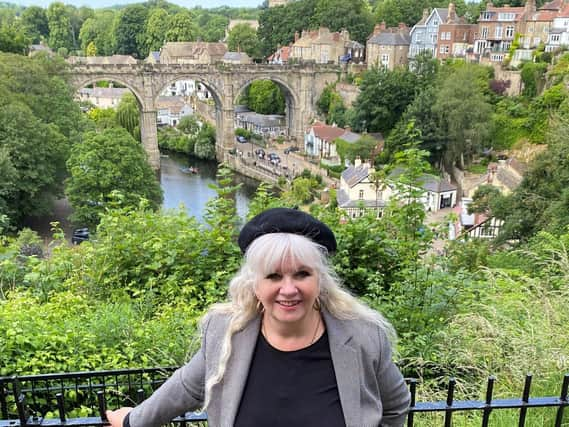Harrogate Labour Party calls for new strategy on travellers camps after eviction orders are served in Knaresborough


The plea follows Harrogate Borough Council' s decision to serve eviction orders after caravans began arriving last week at the site near the rugby field in Knaresborough.
Advertisement
Hide AdAdvertisement
Hide AdSharon Calvert, Women’s and Equality Officer of Harrogate and Knaresborough CLP says this is a perennial situation which the council could and should take steps to solve once and for all.
The Labour Party officer said: "Yet again an eviction notice from Harrogate Borough Council has been issued against Travellers and Gypsies on their way to Appleby Fair.
"This happens every year. Different locations are encamped and we get Harrogate Borough Council serving eviction notices, then social media is filled with vile comments - many of which would go under 'hate crimes'.
By having well maintained transit camps in the area two weeks before and after Appleby Fair, which is normally held the first week in June but delayed this year due to the pandemic, it would solve some of these issues."
Advertisement
Hide AdAdvertisement
Hide AdBut Harrogate Borough Council said there were already two official sites in the county and it had to treat each case on its merits.
An official statement by Harrogate Borough Council said: "There are two official Gypsy and traveller sites in the Harrogate district, at Bickerton and Thistle Hill, both owned and managed by North Yorkshire County Council.
“Outside of these sites, if Gypsies and travellers set up a camp on council-owned land, and if they’re causing problems, they’ll be moved on as soon as is possible and reasonable.
"We consider each case on its merits.
“If they’re on private land, it’s usually the landowner’s responsibility.”
Advertisement
Hide AdAdvertisement
Hide AdHarrogate and Knaresborough Labour Party also says North Yorkshire County Council should look to examples of local authorities elsewhere.
Sharon Calvert said: "It’s time that councilors from this area who are on the North Yorkshire County Council addressed this situation and looked elsewhere for solutions rather than conflict.
"Durham County Council have set up the nine Temporary Stop Over Areas (TSOAs) along roads traditionally used on the journey and their Gypsy, Roma, Traveller Service is ensuring facilities temporary toilet facilities, refuse collections and, in some cases, water supply for animals, is provided.
"Providing stop over areas will benefit both the Gypsy, Roma and Traveller (GRT) community who will be able to access sites with a range of facilities and reduce the number of unauthorised encampments thus lessening any issues for local residents and businesses."
Advertisement
Hide AdAdvertisement
Hide AdIt's not the first time in recent years Harrogate Borough Council has had to serve eviction notices on travellers' camps.
In 2019, the council used its legal powers of removal when a 'mini-caravan park' materialised over one May weekend, just as it had done the year before in 2018.
The national picture on travellers' camps is little different to the local one - with much the same battle between public fears over camps and fly-tipping, travellers' human rights and local councils' legal duties repeating on a cycle of action and reaction over the last six decades.
A Joseph Rowntree Foundation report of 2020 analysed the recent history of government attempts to address Gypsy and Traveller housing needs through legislation without finding a resolution acceptable to all at any point.
Advertisement
Hide AdAdvertisement
Hide AdIn 1960, under the Conservative government, the Caravan Sites (Control of Development) Act caused the closure of many stopping-places used by Gypsies and Travellers as they moved around the country.
In 1968, Labour MP Eric Lubbock’s private bill resulted in the 1968 Caravan Sites Act, which required local authorities to provide sites for Gypsies in England.
This Act required that counties, ‘…ensure adequate accommodation for all those residing in or resorting to their areas’ and that district councils should design, build and manage sites.
However, the local government reorganisation under the following government from 1972 to 1974 saw change in the structure and organisation of government.
Advertisement
Hide AdAdvertisement
Hide AdAdditional issues around exemptions and designations, so soon after the 1968 Act came into force in 1970, meant that lines of responsibility were confused and there was not as much progress as envisaged.
In addition, 1974's local government reorganisation meant that patterns and models of site management were complex and a variety of arrangements were made between the districts and the counties.
The next biggest change arrived in 1994, when the Criminal Justice and Public Order Act under Prime Minister John Major repealed many of the duties of the Caravan Sites Act (1968).
Political and legislative debate over the 1994 Act, which took away the duty from local authorities to provide sites, continues to this day under a Tory adminstration.
Advertisement
Hide AdAdvertisement
Hide AdBut recent years have seen attempts to move the issue forward.
Growing controversy on the subject under the Blair Government prompted the Local Government Association to investigate.
One of the key findinsg set out in its Gypsy and Traveller Task Group Report (2006) was that council leadership was needed to drive through the agenda and that there was, ‘…a need to promote better communications with local media and stakeholders over Gypsy and Traveller accommodation needs and provision’.
The debate continues...